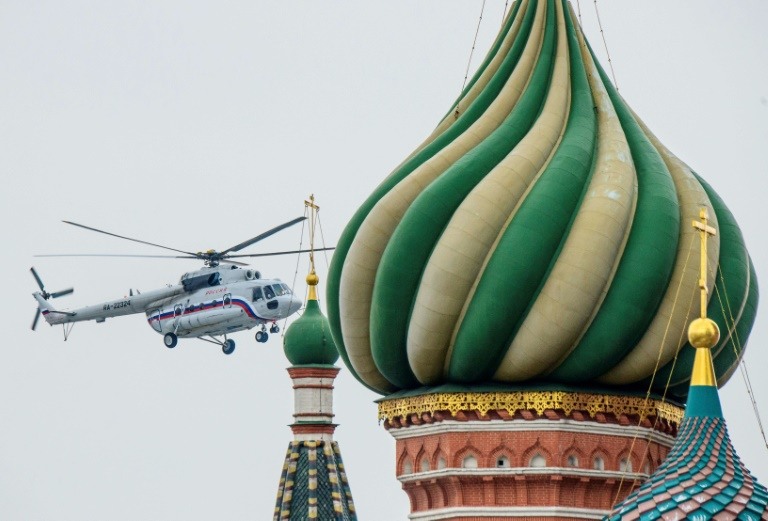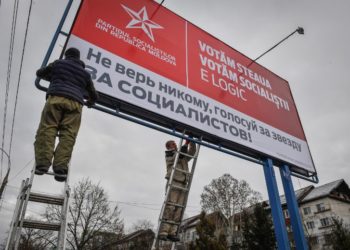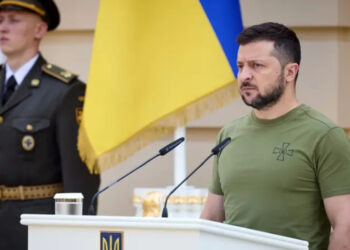Every day adds new details to the saga of attempted murder in the U.K. city of Salisbury, where former Russian spy Sergei Skripal, 66, was allegedly poisoned by the Kremlin.
On March 14, British Prime Minister Theresa May told the Parliament that Russia was to blame for the nerve agent attack. Moscow, however, has been denying responsibility, claiming that it is British intelligence services that were involved in the incident.
On Monday, Russian Foreign Minister Sergei Lavrov suggested that the poisoning of Mr. Skripal and his daughter Yulia “could also be in the interests of the British special forces who are known for their abilities to act with a license to kill.”
At the same time, he denied the attack’s “sophistication” meant it was likely to have been approved by the Russian leadership, as some reports have suggested.
“If I understand correctly, sophisticated attacks usually lead to instant death,” Mr. Lavrov said.
Mr. Skripal remains in a critical but stable condition. His 33-year-old daughter came out of critical care on Thursday and was “improving rapidly,” according to Salisbury District Hospital. She is now in a stable condition — with the BBC reporting that she was conscious and talking.
Who Is Sergei Skripal?
Colonel Skripal, originally from Ukraine, was a Soviet and later Russian intelligence officer. He was a double agent and concurrently worked for British Secret Intelligence Service (MI6) in the late 1990s.
In 2004, five years after his retirement, Mr. Skripal was arrested for treason. It was proved in a court that he had provided MI6 with information about dozens of Russian secret agents operating in Europe and secret military objects. He continued to collaborate with MI6 after his retirement as well.
In 2006, the colonel admitted his guilt and was sentenced to 13 years in prison. However, four years later he was pardoned by Russia’s then-president Dmitry Medvedev. In a deal with the U.S. and the U.K., Moscow exchanged Mr. Skripal and three other convicted double agents for ten Russian spies arrested in the U.S. in 2010.
Mr. Skripal got a shelter, citizenship and a pension in Britain. He and his family moved to a small British city of Salisbury in the south-west of the country and lived there up to the present moment.
What Happened to Mr. Skripal?
In the last five years, Mr. Skripal lost his wife, who died of cancer at the age of 59, his elder brother, and his son, who was only 43 and died of liver failure in Russia’s Saint Petersburg.
On March 4, Mr. Skripal and his daughter Yulia, who came from Russia to visit him, were found on a bench near a Salisbury shopping mall. The woman was unconscious, and Mr. Skripal acted like if he was high, eyewitnesses said.
It was soon established that the Skripals were attacked with a nerve agent. Policeman Nick Bailey, who investigated the case, fell into a coma too, and dozens of locals requested medical help after the attack.
“It is an affront to the prohibition on the use of chemical weapons. And it is an affront to the rules-based system on which we and our international partners depend,” Prime Minister May said in her speech to the British Parliament.
That speech led to a mass expulsion of Russian diplomats: 23 of them had to leave the U.K., and dozens had to depart other countries in Europe and Northern America, making it the single biggest expulsion in over 30 years.
The Russian embassy in London has lost 40 percent of its staff. Ms. May said they had been identified as undeclared intelligence officers.
By the end of March, Russia had to arrange departure of 152 of its foreign embassies’ employees all over the world.
“It’s obvious now that Russia’s intelligence capacity is going to degrade due to massive diplomats’ expulsions. The bigger the embassy, the easier it is to fit intelligence officers in it,” Grigorii Golosov, a political scientist and professor at the European University in Saint Petersburg, told The Globe Post.
Mr. Golosov had no doubt that most of the expelled diplomats were actual intelligence officers. “These ‘diplomats’ were working with agents in the field. And now the agents are about to lose their directors,” he said, adding that “Russia isn’t going to be able to recover its intelligence network any time soon. One hundred fifty-two is a big number.”
But the expulsion of the Russian diplomats was only one of the measures London used to respond to the nerve agent attack.
Prime Minister May said from now on, Britain was going to protect itself more carefully by increasing checks on private flights, customs, and freight, for instance.
In addition, neither members of the British government nor representatives of the Royal Family will attend the 2018 FIFA World Cup in Russia this summer. Moreover, London has started seeking alternatives for Russian gas.
“There are some [measures] that cannot be shared publicly for reasons of National Security,” Ms. May said, as quoted by Sky News.
It took Russia three days to respond to the U.K. measures by expelling 23 British diplomats, closing the British Consulate in Saint Petersburg and shutting down all activities of the British Council.
“It is also obvious that there are going to be secret intelligence officers among those diplomats which Russia will expel in return. So Western countries’ intelligence capacity is going to weaken too,” Mr. Golosov noted.
What Is Novichok?
The U.K. has established that Mr. Skripal and his daughter were poisoned with a nerve agent called “Novichok.” The Russian name of this chemical weapon means “newbie” or “newcomer.” It was developed in the USSR, and scientists who worked on it claim that it is the deadliest nerve agent ever made.
Vil Mirzayanov, a chemist and one of the main Novichok creators, said that only Russia could be behind the Salisbury attack. Even the mere existence of this weapon was a top secret. Mr. Mirzayanov had a strong belief that any other country or group could not produce the agent.
“These people are gone — the man and his daughter. Even if they survive, they will not recover. That is the terrible damage it does,” Mr. Mirzayanov, who is now living in the U.S., told The Telegraph. According to him, many more Salisbury inhabitants could have fallen ill.
The scientist explained that two harmless components of the nerve agent could be manufactured in Russia. These ingredients could be brought to the U.K., where they were combined inside a tiny, easily hidden aerosol spray.
Russia officially denies producing Novichok. Country’s Permanent Representative to the United Nations Vasily Nebenzya claimed that it was highly likely that the agent was manufactured in England.
“In the middle of 1990s western intelligence services exported from Russia several specialists, we do know their names, and some documentation to continue researches in that (Novichok) direction in the U.K. and the U.S. as well. And they have succeeded in it,” Mr. Nebenzya said, as quoted by Interfax.
“British experts needed so-called control standard to establish with full confidence that this nerve agent was Novichok and not any other. It must be compared with the standard. If they say that this gas is Novichok, then they a priori have a standard of this substance, so they have a formula of it”, he added.
Who Had Access to Novichok?
On March 20, Russian state news agency RIA Novosti published an interview with one of the Novichok’s creators — professor Leonid Rink.
Mr. Rink has previously explained that the agent blocks cholinesterase, a vital enzyme which participates in the transmission of stimulation from one neuron to another. “In the absence of free cholinesterase, the body experiences complete paralysis of all vital functions (consciousness, respiration, and cardiovascular system).”
According to the first version of the interview, which was later edited, Mr. Rink said Novichok was not just one agent but “a whole system of chemical weapons.” It had different versions: the USSR used the version number five, or Novichok-5. “They haven’t used the name without numbers,” Professor Rink said.
Soon after publication, RIA Novosti edited out the quote about the chemical weapons system. “It is absurd to talk about Novichok formula and the project with this name,” the new line read, as was noticed by Novaya Gazeta.
Mr. Skripal was not the first person poisoned with the help of Novichok. Back in 1995, the agent killed Russian banker Ivan Kivelidi. The probe into the case lasted for years and ended with nothing, since the statute of limitations expired.
Novaya Gazeta claimed that Mr. Rink was responsible for the banker’s murder: at that time, he worked on Novichok and sold the agent to criminals. Mr. Rink admitted his guilt, but was not punished, the newspaper said citing judicial documents in its possession. Moreover, the professor allegedly continued selling the agent, and his customers included Chechen criminal groups.
What Do Officials Say?
Russia has requested nerve agent’s samples and access to the Skripals, but the U.K. refused to respond to the demands. However, the British government has agreed to provide the samples to the Organization for the Prohibition of Chemical Weapons (OPCW) and called for an emergency meeting of the United Nations Security Council.
“This is another indiscriminate anti-Russian campaign,” Russian Foreign Ministry said in a statement.
The ministry’s spokesperson Maria Zakharova called Ms. May’s speech in the British Parliament “trash” and “a performance,” while Minister Lavrov said the accusations against Russia were “boorish” and “unfounded.”
Responding to the statements, U.K. Defense Secretary Gavin Williamson recommended Russia to “shut up.”
“It’s absolutely atrocious and outrageous what Russia did in Salisbury — we’ve responded to that. Frankly, Russia should go away — it should shut up,” Mr. Williamson said as quoted by BBC.
Foreign Secretary Boris Johnson went further by saying that it was “overwhelmingly likely” that it was Russian President Vladimir Putin himself who ordered to use the nerve agent in England.
But why would Mr. Putin do that right before the presidential election and the World Cup?
“When one says ‘Russia,’ one imagines a unified subject with a joined goal-setting [mechanism] and a direct line of assignments,” political scientist Ekaterina Schulman told The Globe Post. “But in reality, spies and former spies, intelligence officers and former intelligence officers exist in a grey zone with its own actors who may or may not care about the election and the World Cup. They care about events which may not be even known outside the grey zone.”
Ms. Schulman said it was impossible to understand at this point who took advantage of the Skripal case. “Any crime looks terribly disadvantageous when it becomes known [to the public]. But for those who committed that crime, it hadn’t looked disadvantageous. Moreover, the crime looked like a reasonable way to solve problems for them,” she said, noting that there were opposing sides even within the Kremlin and Russian intelligence services.
The Skripal case is a story that lacks a lot of details, but one thing is clear – Mr. Putin is very likely to have a rough time.
“Many of us looked at a post-Soviet Russia with hope. We wanted a better relationship, and it is tragic that President Putin has chosen to act in this way. But we will not tolerate the threat to life of British people and others on British soil from the Russian Government. Nor will we tolerate such a flagrant breach of Russia’s international obligations,” Prime Minister May said.



















